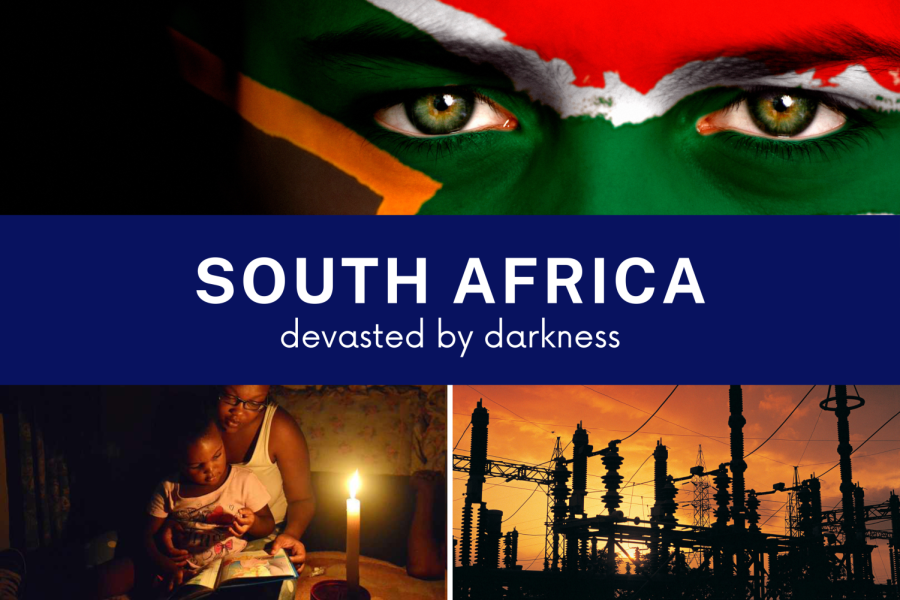A nation in darkness: South Africa’s loadshedding nightmare
Eskom was founded in 1923 with a mandate to supply electricity to the nation and support economic growth and development.
Imagine a land where the interruption of electricity is as constant and inevitable as the dawn of a new day. A place where the uncertainty of light is as much a part of daily life as the rising sun.
In the past two years, the phenomenon of loadshedding, or planned power outages, has become a ubiquitous reality in the nation of South Africa, causing widespread chaos and major disruptions to life across the country.
“Every day, the power is cut. When I make tea, the stove suddenly stops working. While I am on a phone call, our Wi-Fi network suddenly drops. These little inconveniences have made all of our lives extremely difficult,” said South African resident Narendra Khesav.
The root of the problem
The underlying cause of the current crisis can be traced back to the state-owned power utility, Eskom, which is currently grappling with a dire financial and operational predicament. The organization is facing major complications in maintaining its aging infrastructure and keeping pace with national energy demands. This, in large part, has resulted in the scarcity of power supply.
“Eskom is very frustrating. They have no idea what they are doing. It has been two years and they still have not fixed the problem at hand. They are ruining this country – left, right, and center,” said South African resident Dhansukh Manilal.
Reports have also surfaced of individuals within the organization engaging in a wide array of corrupt practices, ranging from the embezzlement of funds to the nepostic award of contracts. These unscrupulous actions have led to a depletion of resources and a failure to invest in the necessary maintenance and upgrading of power plants, exacerbating the current crisis.
“Such an important government organization cannot be so corrupt and bankrupt. It is essential to keep our nation moving forward,” said Khesav.
The depth of the issue
Eskom’s loadshedding crisis has had far-reaching and detrimental effects, troubling the function of businesses, causing traffic lights to malfunction, and igniting major disruptions to essential services nationwide.
“The entire economy is in disarray. Productivity has become completely shattered. The costs to keep the wheels churning in South Africa is rising exponentially,” said former resident Jignesh Kantilal.
In addition, the daily power outages are causing severe inconveniences to citizens everywhere, with many deprived of access to basic services, such as internet and phone connections, kitchen appliances, and any equipment that requires some form of electrical power.
“In today’s modern times, people having to compensate for the use of power should not even be a thought. But, in South Africa, it is a necessity. This is a problem that needs to be addressed,” said Kantilal.
Many South Africans are taking various measures to combat the widespread loadshedding crisis. Some are investing in backup generators and solar power systems to ensure continuous power supply during blackouts whilst others are utilizing energy-efficient appliances and conservation practices to reduce energy consumption.
“Sometimes, the power never comes back on. So, I decided to invest in an inverter, and it acts as my own personal power plant. It was not cheap, but it was definitely worth the cost,” said South African resident Kiran Tailor.
The way forward
Due to the inherent frustration of loadshedding, various citizen-led initiatives have developed across the country. These programs aim to bring attention to the reality of the issue and advocate for government action to address it.
The African National Congress (ANC), under the leadership of President Matamela Cyril Ramaphosa, has advocated for the strengthening of Eskom and its power-supply facilities. The Democratic Alliance (DA), however, have pushed for the exploration of alternative energy sources as well as the privatization of the energy sector as a means to guarantee a sustainable future.
“Eskom is in crisis and the risks it poses to South Africa are great. It could severely damage our economic and social development ambitions. We need to take bold decisions and decisive action. The consequences may be painful, but they will be even more devastating if we delay,” said Ramaphosa.
Additionally, various parties have called for improving the efficiency of Eskom via a total reduction of internal corruption. Many have cited that reduced corruption and increased transparency would elevate power-supply infrastructure around the country.
“In South Africa, corruption is tainting the foundation of our society, eroding its ethics. and hindering progress. To be honest, it is like a cancer that spreads and undermines the very essence of how we live,” said Kantilal.
At the end of the day, the essence of loadshedding lies in its devastating impact on the South African people, disrupting the lives of millions under the concealed veil of pure corruption. However, many across the nation hope for a solution that will imbue stability into the essence of daily life and for a brighter future where steady power flows like an unceasing tide.
Your donation will support the student journalists in the AVJournalism program. Your contribution will allow us to purchase equipment and cover our annual website hosting costs.

